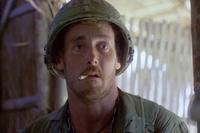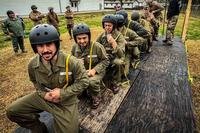Retired Army officer and West Point graduate Michael Mammay's debut novel "Planetside" is out this week. The sci-fi thriller follows a a seasoned military officer who is pulled out of near-retirement to investigate the disappearance of a high councilor’s son. He discovers a mysterious and deadly conspiracy on a distant, war-torn planet. In this article for Military,com, Michael explains how his military service inspired this story.
I was in Kandahar, Afghanistan in early 2014 when I had an idea that would eventually lead me to write "Planetside." It wasn't much at the time…just a thought. I'd started writing a little in my spare time, but I didn't think about the idea in terms of a book at that point. It was just an idea.
Kandahar airfield had a weird command structure. There was a regular army division headquartered there, which I was part of, along with a special operations unit, an airfield run by the US Air Force, and a hospital run by Medical Command.
The thing that made it odd was that none of the units worked for each other. They existed in a kind of symbiosis. They shared missions sometimes, and of course everything worked out because the leaders of the organizations were experienced professionals, and we were all on the same side. That's what led me to wonder:
What if they weren't?
What if instead of being hyper-competent professionals, the commanders had a little more ego? What if I ramped up the asshole factor on everybody involved a few notches? I typed a page of notes on it, set it aside, and didn't really think about it for a while. It wasn't a story. It was a setting.
When I made the decision to write military science fiction (I had been writing fantasy) I dusted off that document, and had the blueprint for what became Cappa base, where a lot of the action in Planetside takes place. I came up with a kernel of a plot—a missing person story—but mostly I had ideas for what I wanted to do with a military story. I didn't know the plot, but I knew the environment I wanted to show.
I wanted to write real soldiers. I wanted to write them the way that I know them. I think sometimes in the civilian world, people think about soldiers as one entity—disciplined men and women, physically fit, rigid in their thinking, and who live and die to follow orders.
Nothing could be further from the truth. Soldiers, first and foremost, are individuals. Some are smart, some aren't. Some are ridiculously fit, some would rather lounge around. Some follow the rules, others…not so much. There are so many different personalities, and I wanted to populate my world with those characters.
Another aspect I wanted to capture was the relationship between soldiers. Not all soldiers like each other, and I wanted to show that. Sometimes the bond transcends friendship, and I wanted to portray that too. In the first chapter of "Planetside," when Colonel Carl Butler goes to visit General Serata, it goes beyond friends. They're brothers. They like each other, and beyond that they've been through hard times together that other people can't even begin to understand. There's an unspoken trust, and a sense that they'd do anything for each other.
I also wanted to capture the combat. I wrote "Planetside" in first person, and I tried to keep the focus tight to the character and put the reader as close to the action as possible. When things are exploding nearby, the overwhelming thought often isn't "How do I get at the enemy?" A lot of times it's "What in the f**k is happening?" Military operations are chaotic on a good day, and when bullets start flying it gets downright confusing.
Sometimes you don't even know what happened until you sit down with people after and talk it through, find out what everybody saw. Even then you can't be sure, because what people think they saw might not have been what really happened. Everyone is pumped full of adrenaline, and everyone has a different focus.
It's a normal thing to do an exercise, get everybody together afterward to talk about what happened, get their stories, and then have the exercise observers turn on the tape and show something completely different from what everybody was absolutely sure happened.
These are things I experienced in real life. The challenge was translating them into a book that wasn't specifically about these elements. The combat environment and the military politics are the framework, not the story. These things all lend themselves well to a military mystery like "Planetside." They are really just basic literary elements.
"Soldiers as individuals" is nothing more than characterization. Complex relationships between characters give those characters purpose, and add nuance to their alliances, weight to their betrayals, and consequences to their failures. I wanted to put readers up close in combat scenes, to give them a feel for the action and the confusion. That tight perspective creates a sense of the unknown, delivering the tension one would expect from a thriller/mystery.
Modern war is a complicated thing, and bases like Kandahar develop because smart commanders adapt to meet the ever-changing situation. I took that and turned up the volume, making the commanders less reasonable, the situation more dysfunctional. In combat, soldiers almost always want information they don't have.
On the warped version of a base in "Planetside," commanders with inflated egos hide that information, withhold intelligence, and sometimes actively act against each other. As the main character in the book says, it's a messed up way to run a war. But it makes a great environment for a story.




